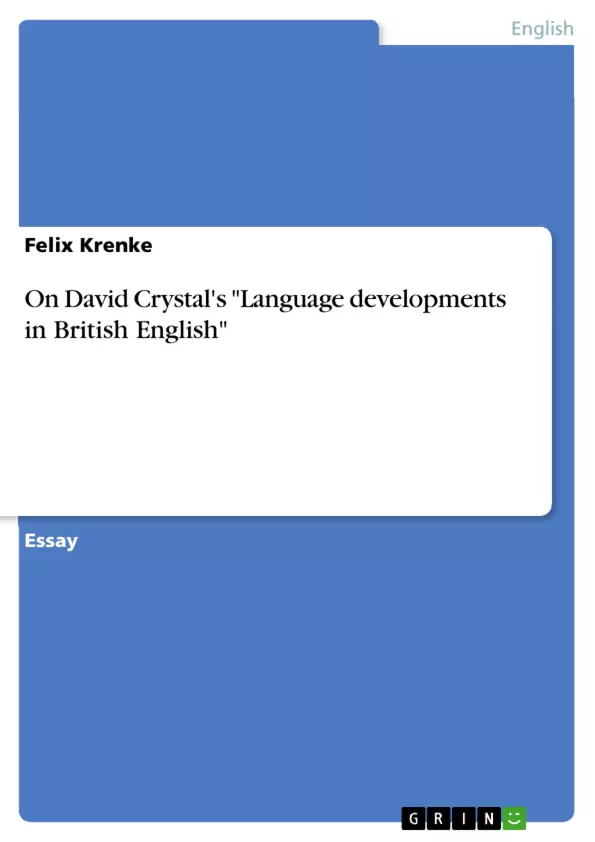David Crystal's essay “Language Developments in British English” deals with recent changes of the English Language and its causes. Throughout the text, Crystal points out that Language changes alongside culture and society. Moreover, he alludes that they do not only change to a similar extend, but that they also have a strong impact on one another. The author collects arguments in favour of language change and against it. The following text seeks to discuss the text by David Crystal against the background of the given statement by Jonathan Swift, moreover it will be carved out whether the arguments which oppose language change outweigh the ones which support it.
Table of Contents
- Introduction
- Two Perspectives
- The First Change: Pronunciation
- The Second Change: Vocabulary
- Arguments in Favour of Language Change
- Arguments Against Language Change
- Conclusion
Objectives and Key Themes
This essay by Felix Krenke explores the changes occurring in the English language, drawing upon David Crystal's work “Language Developments in British English” and contrasting it with the view of Jonathan Swift who advocated for a fixed and unchanging English. The essay aims to analyze Crystal's arguments for and against language change, examining whether the arguments against change outweigh those in favor.
- Language Change and Its Relation to Culture and Society
- The Impact of Pronunciation and Vocabulary on Language Development
- The Role of Social and Political Factors in Shaping Language
- The Feasibility and Desirability of Fixing Language
- The Importance of Language Flexibility for a Flourishing Culture and Economy
Chapter Summaries
- Introduction: The essay introduces the main themes of language change and its relationship to culture and society. It presents the contrasting viewpoints of David Crystal and Jonathan Swift.
- Two Perspectives: This section highlights the different approaches of Crystal and Swift towards language change. Crystal emphasizes the interconnectedness of language and culture, while Swift advocates for a fixed and unchanging English.
- The First Change: Pronunciation: This section focuses on the changes in pronunciation within English, illustrating how these changes can reflect geographic and social distinctions.
- The Second Change: Vocabulary: The essay examines the changes in vocabulary, particularly in relation to cultural and political innovations.
- Arguments in Favour of Language Change: This section explores the arguments presented by Crystal in support of language change, emphasizing its role in reflecting cultural evolution and adapting to new ideas.
- Arguments Against Language Change: This section outlines the arguments against language change, primarily focusing on the concerns of preserving tradition and achieving consistency in language.
Keywords
The primary keywords and focus topics in this essay include language change, cultural evolution, pronunciation, vocabulary, social and political influences, and the debate surrounding the feasibility and desirability of fixing language.
Frequently Asked Questions
How does David Crystal view language change?
Crystal argues that language changes alongside culture and society. He views language as a flexible tool that must adapt to new innovations, political changes, and social shifts to remain vibrant.
What was Jonathan Swift's stance on the English language?
In contrast to Crystal, Jonathan Swift advocated for "fixing" the English language. He believed it should be protected from change to maintain consistency and tradition, fearing that rapid changes would make old texts unreadable.
What causes vocabulary to change in British English?
Vocabulary changes are often driven by cultural and political innovations, technological advancements, and the need to describe new concepts or objects that didn't exist before.
Does pronunciation affect social distinction?
Yes. Changes in pronunciation often reflect geographic origins and social backgrounds. As pronunciation evolves, it can either bridge gaps between social classes or create new distinctions.
Is it possible to stop a language from changing?
Most modern linguists, including Crystal, believe it is impossible and undesirable to fix a living language. A fixed language would eventually become a dead language, unable to serve its speakers' evolving needs.
- Citar trabajo
- M. A., M. Ed. Felix Krenke (Autor), 2012, On David Crystal's "Language developments in British English", Múnich, GRIN Verlag, https://www.grin.com/document/1007999



